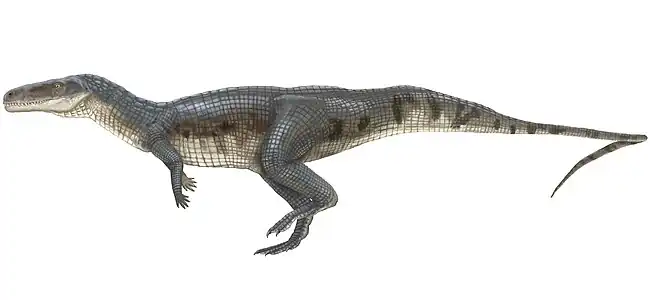Poposauridae
Poposauridae is a family of large carnivorous archosaurs which lived alongside dinosaurs during the Late Triassic. They were around 2.5 to 5 metres (8 ft 2 in to 16 ft 5 in) long. Poposaurids are known from fossil remains from North and South America. While originally believed to be theropod dinosaurs (they mirrored the theropods in a number of respects, such as features of the skull and bipedal locomotion), cladistic analysis has shown them to be more closely related to crocodiles.
| Poposauridae Temporal range: Late Triassic | |
|---|---|
 | |
| Poposaurus gracilis | |
| Scientific classification | |
| Domain: | Eukaryota |
| Kingdom: | Animalia |
| Phylum: | Chordata |
| Class: | Reptilia |
| Clade: | Pseudosuchia |
| Superfamily: | †Poposauroidea |
| Family: | †Poposauridae Nopcsa, 1923 |
| Genera | |
An early cladistic analysis of crocodylotarsan archosaurs included Poposaurus, Postosuchus, Teratosaurus, and Bromsgroveia within Poposauridae.[1] However, later studies found Teratosaurus to be a rauisuchid.[2][3] All recent phylogenetic analyses place Postosuchus either as a rauisuchid [4] or a prestosuchid.[5][6][7]
Genera
| Genus | Status | Age | Location | Description | Images |
|---|---|---|---|---|---|
| Nomen dubium. | Late Triassic | North America | |||
| Junior synonym. | Junior synonym of Poposaurus | ||||
| Valid. | Late Triassic | North America. | |||
References
- Parrish JM. 1993. Phylogeny of the Crocodylotarsi, with reference to archosaurian and crurotarsan monophyly. Journal of Vertebrate Paleontology 13: 287-308.
- Long RA, Murry PA. 1995. Late Triassic (Carnian and Norian) tetrapods from the Southwestern United States. New Mexico Museum of Natural History & Science Bulletin 4: 1-254.
- Galton PM, Walker AD. 1996. Bromsgroveia from the Middle Triassic of England, the earliest record of a poposaurid thecodontian reptile (Archosauria: Rauisuchia). Neues Jahrbuch für Geologie und Paläontologie, Abhandlungen 201 (3): 303-325.
- Weinbaum JC, Hungerbühler A. 2007. A revision of Poposaurus gracilis (Archosauria: Suchia) based on two new specimens from the Late Triassic of the southwestern U.S.A. Paläontologische Zeitschrift 81(2):131-145.
- Gower DJ. 2002. Brain case evolution in suchian archosaurs: evidence from the rauisuchian Batrachotomus. Zoological Journal of the Linnean Society 136: 49-76.
- Nesbitt SJ, Norell MA. 2006. Extreme convergence in the body plans of an early suchian (Archosauria) and ornithomimid dinosaurs (Theropoda). Proceedings of the Royal Society of London B 273: 1045–1048.
- Nesbitt S. 2007. The anatomy of Effigia okeeffeae (Archosauria, Suchia), theropod-like convergence, and the distribution of related taxa. Bulletin of the American Museum of Natural History 302: 84 pp.
Further reading
- Galton, P. M., 1985, The poposaurid thecodontian Teratosaurus suevicus von Meyer, plus referred specimens mostly based on prosauropod dinosaurs. Stuttgarter Beitrage zur Naturkunde, B 116: 1-29.
External links
- Palaeos
- Taxon Search
- Mikko's Phylogeny Archive
- Re: Postosuchus/Rauisuchus - Dinosaur Mailing List archives
